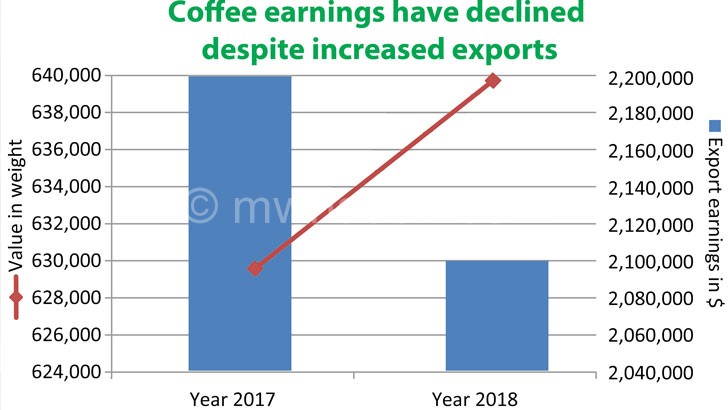Global coffee prices tumble
The Coffee Association of Malawi (Camal) fears the collapse of global coffee prices to $0.98 per pound (lb) will likely affect the season’s earnings.
The fall in prices according to the International Coffee Organisation (ICO)has come about due to oversupply as Brazil, the world’s biggest coffee producer.
Camal chairperson Bernard Kaunda said in a questionnaire response that this may prompt farmers to reconsider their position if the situation may not improve going forward.

Previously, coffee prices fetched around $1.20 (about K888) and $2 (about K1 480) per lb but the prices according to ICO collapsed to $0.98 per lb since 2006 when prices hit the record low $0.88 per lb.
Said Kaunda: “The prospects for coffee in terms of production look better however the biggest challenge will be on revenues to be realised. This is due to the collapse of the international coffee prices on the market. The prices have hit as low as $0.98 per lb which is the lowest price in 13 years.
“In 2017, $2.2 million [about K1.7 billion] was realised from export of 629 282kg of coffee, while in 2018, $2.1 million [about K1.6 billion] was realised from export of 639 176kg of coffee. This figure will go up as some stocks are available in the country that have not been exported yet.
He said the current demand for Malawi coffee is estimated at 10 000 metric tonnes (MT) against production of less than a 1 000 MT.
Kaunda said failure to meet the demand discourages buyers who require large volumes of Malawi coffee, adding that existing few buyers use it for blending with other coffees.
Economics Association of Malawi (Ecama) president Chikumbutso Kalilombe said yesterday that reduced earnings from coffee would have an impact.
He said the slump might coincide with the developments in tobacco sector which is facing the same challenge.
Said Kalilombe: “If the cash crop prices from the combined threshold will go down, then there may be pressure on our currency. When there is pressure on the currency, then we will be talking about imported inflation where prices for imported essential goods such as fertiliser and fuel, for example, might go up”.
Currently, the country has about 3 000 to 4 000 coffee farmers that are organised in cooperatives and aggregates their yields for exports.
Malawi exports 1 000 metric tonnes of coffee a year which is grown on 1500 hectares of land.





